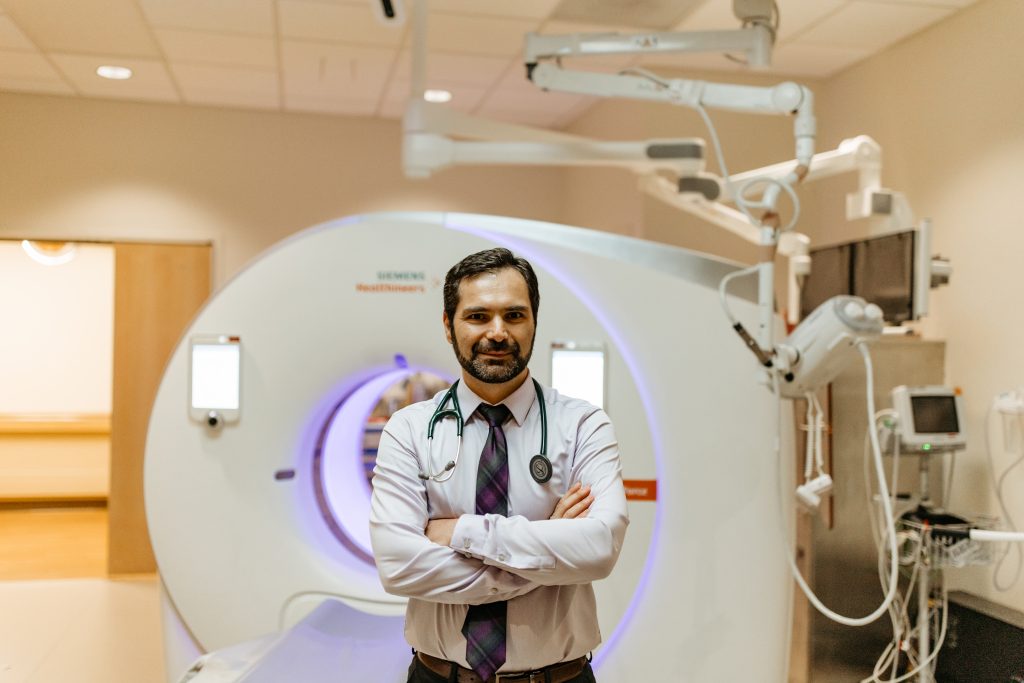A cardiac MRI, or cardiac magnetic resonance imaging, is a non-invasive way for doctors to look closely at the structure and function of your heart as well as major blood vessels.
Cardiac MRI uses a magnetic field, radio waves, and a computer to generate clear, exceptionally detailed pictures of your heart without using radiation. It’s a painless procedure.
Northeast Georgia Medical Center is the first in the northeast Georgia region to offer cardiac MRI services at The Imaging Center Gainesville.
FAQs
Diagnosing valve and other heart problems requires a pristine view of the heart. Cardiac MRI allows your physician to get the most accurate images of a cross-section of your heart for diagnosis and procedure planning. This advanced imaging technique shows if you have a lack of blood flow to your heart muscle because of narrowed or blocked arteries.
Your doctor could use a cardiac MRI to diagnosis issues including:
- Congenital heart defects
- Coronary heart disease
- Diseases of the outer lining around the heart (pericarditis)
- Heart artery blockages
- Heart attack
- Heart failure
- Heart valve disorders
A technician will control a moveable table that slides into the long metal tube of the MRI machine. You’ll lie on the table while the technician provides instructions from another room with a microphone.
While taking pictures of your heart, the machine will produce loud pounding and whirring noises. Earplugs or headphones with music can help block the noise. Sometimes, you’ll need an IV for injecting a special dye that provides better contrast for the images. The dye doesn’t contain iodine and is less likely to cause allergic reactions than ones used for CT scans.
You’ll be asked to hold your breath to stay still as the technician takes the pictures. During the 30- to 90-minute process, you won’t feel anything from the magnets or radio waves being used.
A cardiac MRI is a painless test with few risks or side effects for most people. The special dye used for some procedures rarely produces an allergic reaction.
Since MRI uses magnets, it may not be safe if you have a pacemaker or other metal device or fragment in your body including:
- Artificial heart valves
- Clips
- Inner ear implants
- IUDs (intrauterine devices)
- Pins, plates or screws
- Staples
- Stents
- Dental implants
Please let your doctor know if you have any of these devices before your test.
If you’re extremely uncomfortable in enclosed spaces, let your doctor know before your MRI so you can explore coping mechanisms or medications to help your anxiety.
You can usually resume your regular activities after your MRI is complete. Your radiologist will send the image results to your cardiologist. Within a week or more, your doctor will review the results and schedule a follow up with you.
Why Choose Georgia Heart Institute for Your Cardiac MRI?
As Georgia’s leader in heart services, all diagnostic services at Georgia Heart Institute are provided by our expansive and highly-trained team of certified technologists and our board-certified non-invasive cardiologists. These experts specialize in the early detection of all conditions on the heart disease spectrum. We offer convenient and expert heart diagnostics and care, all close to home and away from the hustle and bustle of Atlanta.

Request an Appointment
Cardiologists at each of our locations can refer you for one of these imaging procedures or determine which test or diagnostic would be best to help determine your cardiac treatment plan.
Please request an appointment for an Cardiac MRI or other heart concerns by calling 770-219-7666 (option 3) or by clicking the “book an appointment” button and finding a Cardiologist near you.

